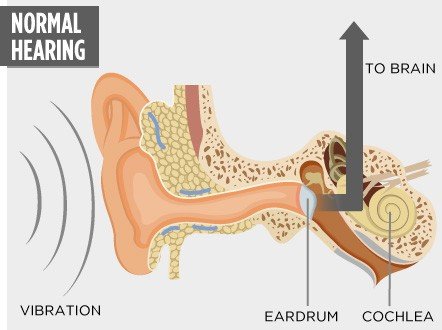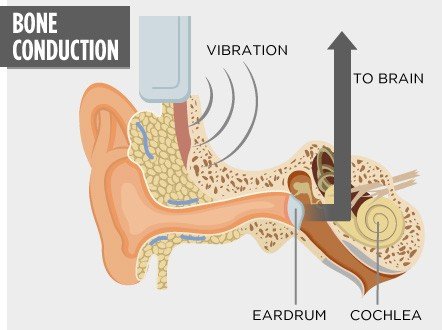
We all have an idea of what our own voice sounds like - I mean, we hear it a thousand times a day, right?
But as soon as we listen to a recording of our own voice, we cringe.
Most people strongly dislike hearing the sound of their own voice - why is that?
We hear other people's voices (and music, and ony other sounds) through air conduction.
The sound travels through our ear and makes our ear drums vibrate slightly, which in turn makes tiny bones in our ear (ossicles) intensify the sound waves before they enter our cochlea - the auditory part of our inner ear, which is fluid-filled and shaped like a spiral.
The cochlea is equipped with thousands of little hair cells that transfer the vibration into electrical signals, which are then sent to our brain and give us the ability to hear sound.

Now when we hear our own voice while we talk, we hear the sound a lot differently.
The sound reaches us through bone conduction - we create sounds by vibrating our vocal chords, and these vibrations get transported to our skull.
This vibration also affects the fluid in our conchlea, since the inner ear is located inside our (vibrating) skull.
Our bones transmit low frequencies more effectively, so in general our own voice sounds lower to ourselves than it actually is when we talk.

When we listen to our own voice recorded, we listen to it through air conduction and not bone conduction.
Our voice appears to be much higher to us, and generally just sounds a lot different than what we're used to hear!
Humans generally dislike things that are "not like they used to" more - this is due to the so-called Mere Exposure Effect.
So don't worry, you might think that your voice sounds terrible to everone around you, but actually, that's how they always hear your voice and they probably like it.

But why do we actually like certain voices more than others?
This has evolutionary reasons - an attractive voice in males is associated with a more V-shaped upper body (Shoulder-Waist ratio), and also linked to higher testosterone levels.
In women, high estrogen levels are linked to a perception of a more attractive voice. Studies have also suggested that female voices sound particularly attractive during ovulation.
So the attractiveness of voices is linked to evolutionary reasons and goes hand in hand with our ancient instincts of looking for a fertile partner with good genes.
We also associate certain aspects of a voice (high, low, raspy, nasal, shaky...) with certain characteristics, and therefore the voice plays quite an important role when getting the first impression of someone.

While everybody thinks they hate listening to their own voice, a very interesting study has shown quite different results:
The participants were individually asked to record their voice. Then they were distracted with some tasks.
Afterwards, they listened to the voice recordings of the other people, and rated them from 1 to 7.
What they didn't know: Their own voice recording was mixed in between the others as well!
And surprisingly, the participants rated their own voice higher (= more attractive) than other people did - a score of 4.7 compared to 3.6, how the other rated their voice.
So we might actually like our own voice more than others do - subconsciously!
Images: 1, and Steemit Logo2, 3, 4, 5 by @rubenalexander,
- Instagram -

© Sirwinchester
This article has been published previously
https://steemit.com/science/@konstantin/scientists-explain-why-people-hate-the-sound-of-my-own-voice
only Morgan Freeman Loves his own GODLY Voice
haha!
I think everyone has experienced this .. great read!
now that explains it - i HATE listening back to my own voice lol
great topic choice, and awesome visuals as well! your posts always look great, keep it up
thank you for the compliment, appreciate it
I've always wondered this, thanks for the great explanation :D
so do people actually get used to it and then love hearing their own voice?
mere exposure effect.. never heard about this but sounds really interesting! thanks for the great input!
Or once in a while people recognized what was up and rated it really high to pad their stats!
jkjkj xP
hahahaha let's hope that wasn't the case!
Good post!
Thanks, resteemed.
Check out these bone conduction sunglasses.
https://steemit.com/music/@rossenpavlov/forget-about-wireless-headphones-try-these-sunglasses-instead
lol!!
i never really did mind much..
I remember thinking at 8 years old, "That's not me, this tape recorder sucks."
haha, I think all of us experienced something like that
Well when ajusting tone in audio recording many times the lower or higher aspects of a voice are emphasised.
I ended up liking the sound of my voice once I was able to boost the levels to where it sounded mostly like it does in my head, I would say most good music is treated in this way somewhat. I wonder if perhaps the reason why the shakey wavy style of singing in recordings in the 20s and 30s was a result of not being able to make those subtle changes with recording equitment avaliable at the time.
That said is is awefully dissapointing, that moment when you know the preception of your voice is more Rick Moranis then Morgan Freeman.
Good article. Thanks for the linkback.
Just wanted to inform you of a typo: "So the attractiveness of voices is linked to evultionary..."
I was just remembering how great James Earl Jones voice was and my impression of the Star Wars trilogy as a kid.
thanks, I'll fix it!
Yes, some voices are really mesmerizing. Voice actors sure do a great job
You can read what I wrote about your post here.
This post has been linked to from another place on Steem.
Advanced Steem Metrics Report for 23rd October 2016 by @ontofractal
Oct 23 - Steemit Ramble #41 - Don't You Hate it When You Miss Good Posts? by @shadowspub
Learn more about and upvote to support linkback bot v0.5. Flag this comment if you don't want the bot to continue posting linkbacks for your posts.
Built by @ontofractal
Good point.
Bone conduction alone is just some rumbling sound in the background though.
Therefore,during simultaneous translation, or singing, you need a monitor of your own voice - because with headphones on, you dont get enough feedback.
Once, there was a technical glitch at one of the events, I translated at.
Accidentally, the sound guys dimmed down the monitors - and inadvertedly, six translators almost started to shout into their mics, compensating for the loss of air conducted hearing of their own voice.
I guess I am not the only translator never to listen to my own recordings. Sim.translation is like an offroad race, you just have to go with the flow. And do it fast.
Another good one is feeding people back their own voice with a second delay.
With some very few exceptions, they will not be able to speak intelligibly, let alone complete a single sentence.
This was a really interesting read! Thanks for all the fun facts about my lovely voice. :0)